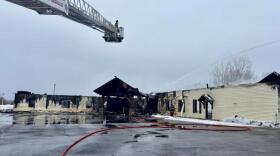The Syracuse Common Council is considering a new community broadband program aimed at improving digital equity throughout the city.
The community broadband program would use $3.5 million of Federal American Rescue Plan Act funds to help underserved communities get affordable, high-speed internet. About 25% of households are without any form of internet and city staff said the lack of reliable internet disproportionately affects low-income families and communities of color.
Syracuse Common Councilor Michael Greene stressed the importance of digital equity especially as so much of day-to-day life involves the internet.
"Everything from scheduling a doctor's appointment to online learning to paying your energy bill — so much of that is done online," Greene said. "For households that don't have reliable access to internet, they fall behind in so many different ways."

The pilot program would serve 2,500 families near the Westside, Southwest and Brighton neighborhoods using fixed wireless technology. If approved, the city plans to provide free service to households for three years. To meet the qualifications for free service a household can earn up to 200% of the federal poverty level — for a family of four that's about $60,000.
Community Broadband Networks FLX, which started in the Finger Lakes, was selected as the provider. James Orioli, of Community Broadband Networks, said they're looking to offer service at a lower cost providing residents of Syracuse with more options and choices.
"There's a number of fine providers at the moment, but by adding another option, it allows those that don't necessarily have the means to access these higher-level networks," Orioli said. "It's going to be an infrastructure the city owns that city can leverage to utilize for their own municipal purposes, as well as, again, bringing access, affordable access to those that need it most in the quickest possible way."
Community Broadband Networks said once the program is rolled out they'll have a 60-day deployment aiming to have enrollment start this summer. While the pilot program is targeting 2,500 households, it could eventually be expanded to other parts of the city to offer affordable options for internet service. The Common Council is set to vote on the proposed program at its Monday meeting.







